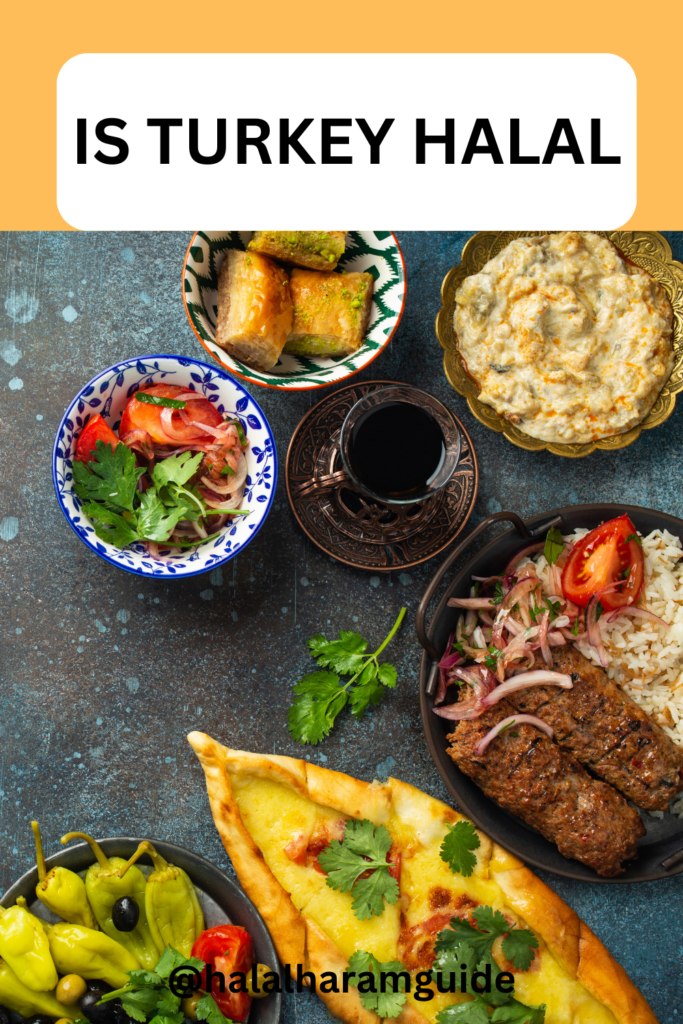Welcome to our blog post where we delve into a commonly asked question: “Is turkey halal?”
Understanding the halal status of turkey meat is essential for Muslim consumers who wish to adhere to Islamic dietary guidelines. In this article, we will explore the criteria and considerations that determine whether turkey can be considered halal according to Islamic principles.
Let’s delve into the details to provide you with a clear understanding of the topic.
What Does Halal Mean?
“Halal” is an Arabic term that translates to “permissible” or “lawful” in English. In the context of Islamic dietary laws, “halal” refers to food and drink that is prepared and consumed in accordance with Islamic principles and guidelines.
Halal food must meet specific criteria and follow prescribed practices, including the method of slaughter, the source of the ingredients, and the absence of certain prohibited substances. For meat to be considered halal, it should be slaughtered by a Muslim who is of sound mind and maturity, invoking the name of Allah (God) at the time of slaughter.
Additionally, halal food should not contain pork or its derivatives, blood, alcohol, or any other substances forbidden in Islam. Halal is not limited to meat but extends to various food and beverage categories, ensuring that Muslims can maintain their dietary preferences and religious obligations while consuming a wide range of products that adhere to these guidelines.
Is Turkey Halal? How Do I Know?
Whether turkey meat is considered halal, or permissible in Islamic dietary laws, depends on several factors.
To determine if turkey is halal, there are specific criteria to consider. Firstly, the turkey must be slaughtered by a Muslim who is of sound mind and maturity, following the Islamic method of slaughter. This method involves invoking the name of Allah (God) at the time of slaughter and ensuring the swift and humane cutting of the throat, windpipe, and blood vessels in the neck.
Secondly, the turkey’s source and processing must adhere to halal standards, which include avoiding cross-contamination with non-halal substances and ensuring that the meat is free from prohibited ingredients such as pork or its derivatives.
To be confident in the status of turkey, many Muslims look for reputable certification labels on products, which indicate that the meat has been sourced and processed in accordance with Islamic guidelines.
Seeking guidance from knowledgeable religious authorities or certification bodies can also provide assurance when determining whether turkey is halal.
What is Halal Turkey?
Halal turkey refers to turkey meat and turkey products that have been prepared, processed, and slaughtered in accordance with Islamic dietary laws and guidelines. To be considered halal, several key criteria must be met.
Firstly, the turkey must be slaughtered by a Muslim who is of sound mind and maturity. During the slaughter process, the name of Allah (God) is invoked, and the throat, windpipe, and blood vessels in the neck are swiftly and humanely cut to ensure the animal’s quick and humane death.
Secondly, the turkey’s source and processing must adhere to halal standards, which include avoiding cross-contamination with non-halal substances and ensuring that the meat is free from prohibited ingredients, such as pork or its derivatives.
To provide assurance to Muslim consumers, turkey products often carry a reputable halal certification label, signifying that they have been sourced and processed in accordance with these guidelines, allowing individuals to enjoy turkey while adhering to their Islamic dietary preferences and religious beliefs.
Where to Find Halal Turkey
Finding halal turkey can vary depending on your location, but there are several common places where you can typically find halal turkey:
Halal Grocery Stores: Many areas with a significant Muslim population have specialized halal grocery stores or markets that offer a wide range of halal products, including turkey.
Halal Butcher Shops: Halal butcher shops are known for providing fresh meat, including turkey. You can often request specific cuts or whole turkeys from these establishments.
Online Retailers: Numerous online retailers specialise in foods and meat products, including turkey. You can order halal online and have it delivered to your doorstep.
Local Farmers’ Markets: Some farmers’ markets may have vendors or farms that offer turkey, especially during the holiday season.
Restaurants and Catering Services: Halal restaurants or catering services may offer dishes that include halal turkey, particularly during special occasions or holiday seasons like Thanksgiving.
Supermarkets: In some regions, mainstream supermarkets may carry sections or products, including turkey, to cater to diverse customer preferences.
Halal Food Festivals or Events: Some cities host food festivals or events where you can find a variety of halal products, including turkey.
Is Butterball Turkey Halal?
Butterball, a well-known brand of turkey products, offers a range of turkey options, including whole turkeys and turkey products. Whether Butterball turkey is considered or permissible for Muslims depends on the specific product and its certification.
Some Butterball products may have halal certification, indicating that they have been sourced, processed, and prepared in accordance with Islamic dietary guidelines, making them suitable for Muslim consumers.
It’s crucial to carefully check the packaging for certification labels or symbols to determine the halal status of a particular Butterball turkey product. If a specific product is not certified as halal, it may not meet the necessary criteria for halal consumption according to Islamic dietary laws.
As halal certification can vary by region and product, it’s advisable to contact the manufacturer or refer to their official website for up-to-date information on halal-certified Butterball products in your area.
How to Purchase a Halal Turkey?
Purchasing a halal turkey involves a few key steps to ensure that you are buying a that meets Islamic dietary guidelines. Here’s how to go about it:
Identify Reputable Retailers: Start by identifying grocery stores, halal markets, butcher shops, or online retailers known for carrying halal products. You can ask for recommendations from local Muslim communities or search online directories.
Check for Halal Certification: Look for the certification label or symbol on the turkey packaging. This certification indicates that the turkey has been sourced, processed, and prepared in accordance with Islamic dietary laws. Pay attention to the specific certification authority’s name or logo, as they may vary.
Inspect the Label: Examine the label and packaging to ensure that the is indeed halal. Check for any additional information about the source and handling of the turkey.
Check the Expiry Date: Ensure that the turkey has not passed its expiry or use-by date, and that it is in good condition. Inspect the packaging for any signs of damage or tampering.
Select the Right Size: Choose a turkey size that suits your needs and the number of people you plan to serve. Whole turkeys are commonly available, but you can also find turkey cuts or parts.
Ask Questions: Don’t hesitate to ask the retailer or butcher any questions you may have about the turkey, including its source, handling, and certification. They should be able to provide you with information and guidance.
Plan Ahead: If you are purchasing a turkey for a specific occasion or holiday, such as Thanksgiving or Eid al-Adha, plan ahead and buy your turkey well in advance to ensure availability.
Consider Frozen vs. Fresh: You can find halal turkey both in frozen and fresh forms. Consider your preferences and the time you have available for thawing and cooking when making your choice.
Store Properly: Once you purchase the halal turkey, store it according to the instructions on the packaging to maintain its freshness and safety.
Cook and Enjoy: Follow your favourite turkey recipe or cooking instructions to prepare and enjoy your halal turkey with family and friends.
By following these steps, you can confidently purchase a halal turkey that aligns with your dietary preferences and religious beliefs.
List of halal food in Turkey:
Turkey is known for its rich culinary tradition, and there are numerous food options available throughout the country. Here is a list of some common foods you can find in Turkey:
Adana Kebab
Iskender Kebab
Shish Kebab
Pide
Lahmacun
Döner Kebab
Manti
Kumpir
Balik Ekmek
Turkish Delight (Lokum)
Baklava
Fresh Fruits and Vegetables
Pilaf (Pilav)
Soup (Çorba)
Turkish Tea (Çay)
List of haram turkey food
Haram foods in Turkey, as in other predominantly Muslim countries, are those that are considered forbidden or prohibited in Islamic dietary laws. Here are 15 examples of haram or non-halal foods:
Pork and pork products (e.g., bacon, ham, sausages)
Alcohol (e.g., wine, beer, spirits)
Foods cooked with alcohol or alcoholic extracts
Any form of intoxicants or substances that alter the mind
Carnivorous animals and birds of prey (e.g., dogs, cats, eagles)
Animals that have died of themselves (carrion)
Blood and blood products
Shellfish and other seafood without scales
CONCLUSION
In conclusion, turkey can be considered halal if it is sourced, processed, and prepared in accordance with Islamic dietary laws.
Ensuring that the meat meets the criteria of proper slaughter and adherence to standards is crucial for Muslims who seek to enjoy this poultry while observing their religious beliefs.
Always look for reputable certification to make informed choices about the consumption of turkey and other foods in line with Islamic principles.
FAQs
1. Is turkey bacon halal?
Turkey bacon can be halal if it is produced and processed in accordance with Islamic dietary laws. This means that the turkey used for making the bacon should be halal, and the processing should not involve any haram (forbidden) ingredients or practices. Look for halal certification on the turkey bacon packaging to ensure its compliance with halal standards.
2. Is turkey halal in Subway?
Whether turkey at Subway is halal depends on the specific location and the availability of halal options. Some Subway outlets in certain areas offer halal turkey and other halal choices to cater to Muslim customers. It’s essential to check with your local Subway restaurant to determine if they provide halal turkey.
3. Is turkey halal in USA?
Turkey can be halal in the USA if it meets the criteria set by Islamic dietary laws. Halal-certified products, including turkey, are available in the USA, and many supermarkets and grocery stores offer options to accommodate the dietary preferences of Muslim consumers.
4. Is eating turkey allowed in Islam?
Yes, eating is allowed in Islam as long as the turkey is halal. Turkey is a poultry bird, and in Islam, the permissibility of consuming meat depends on whether the meat has been sourced, processed, and prepared in accordance with Islamic dietary guidelines.
5. What Is The Islamic Way Of Slaughtering Birds?
The Islamic way of slaughtering birds, including turkey, involves performing a specific method of slaughter known as “Zabiha” or “Dhabiha.” This method requires a Muslim who is of sound mind and maturity to invoke the name of Allah (God) and then swiftly cut the bird’s throat, windpipe, and blood vessels in the neck, ensuring a humane and quick death. This method is designed to meet Islamic dietary requirements and is a fundamental aspect of halal food preparation.
6. Is Turkey Halal In All Muslim countries?
The status of turkey can vary among Muslim-majority countries and regions. While many Muslim countries adhere to similar principles of halal slaughter, certification, and dietary guidelines, there can be variations in interpretation and practice. Some countries have well-established halal certification processes, while others may rely on traditional methods of slaughter. It’s advisable to check with local authorities or religious organizations in specific Muslim countries to understand the specific halal practices and standards in those regions.
- “Is Lobster Halal? Understanding Its Permissibility”
- “Is Drawing Haram in Islam? Understanding the Perspective”
- “Is Fermented Kimchi Halal? Exploring Kimchi’s Halal Status”
- “Is Collagen Halal? Unveiling the Halal Status of Collagen”
- “Is Wine Vinegar Halal? Unveiling Its Permissibility”


